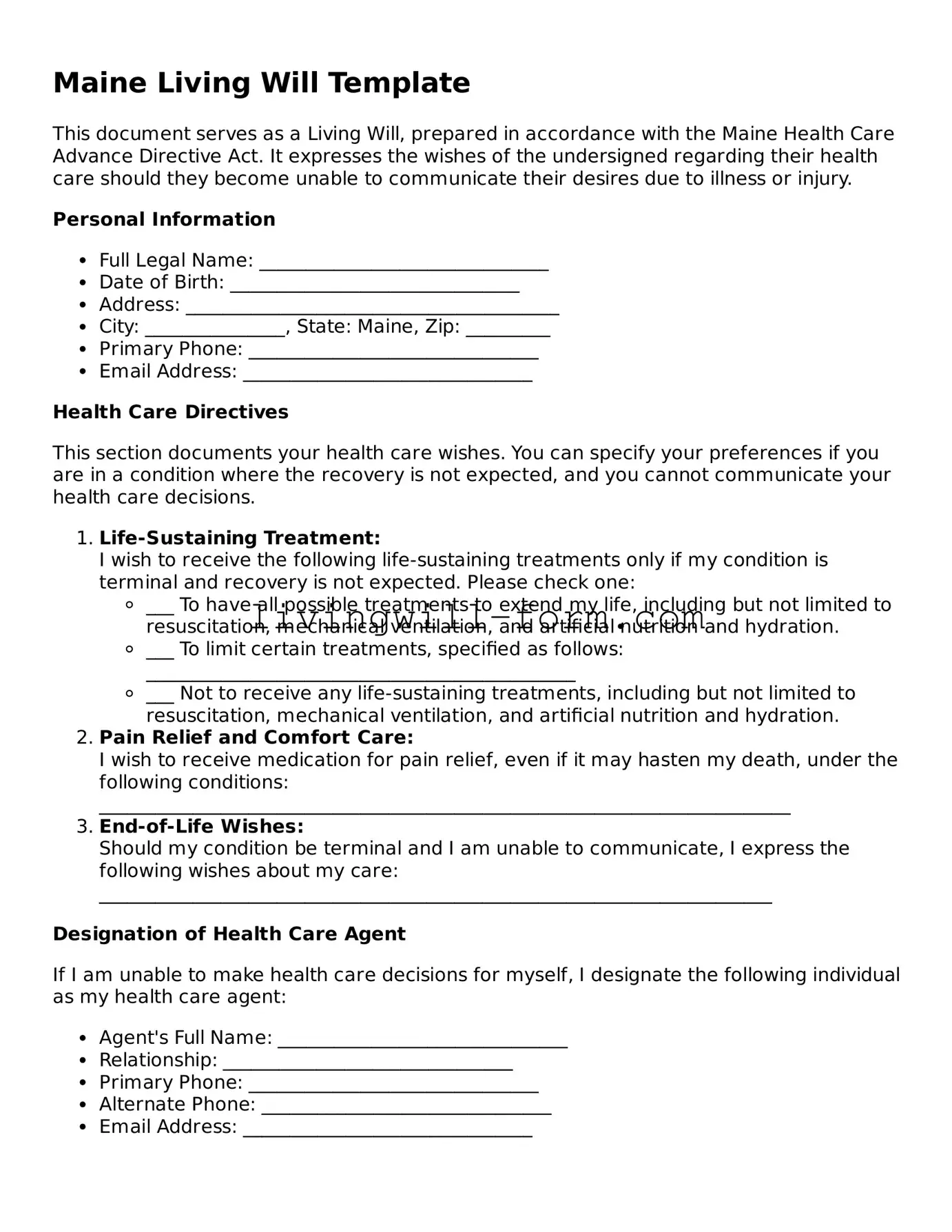The Advance Directive, commonly encountered in many states, closely mirrors the Maine Living Will in purpose and function. This document allows an individual to outline their preferences for medical treatment should they become incapacitated and unable to communicate these decisions themselves. Both documents often include instructions regarding end-of-life care, resuscitation orders, and preferences for interventions like mechanical ventilation or feeding tubes, thus ensuring that a person’s healthcare wishes are respected even when they cannot vocalize them.
A Healthcare Power of Attorney (HCPOA) is another document that shares similarities with the Maine Living Will, albeit with a distinct focus. While the Maine Living Living Will centers on specific healthcare wishes, a HCPOA appoints a representative to make healthcare decisions on behalf of the individual if they are unable to do so. Despite this difference in focus, both documents serve the critical function of guiding healthcare providers when the individual cannot make decisions due to incapacity, ensuring decisions are in alignment with the individual's values and desires.
The Do Not Resuscitate (DNR) Order, a form often included within or associated with a living will, bears resemblance to the Maine Living Will in its implications for emergency medical care. This document specifically directs medical personnel not to perform CPR or take other resuscitative measures if the person’s heart stops or if they stop breathing. Like the Maine Living Will, a DNR is a declaration made in anticipation of a situation where the person cannot make immediate healthcare decisions, aiming to respect the person’s wishes regarding life-sustaining treatments.
The Five Wishes document expands on the concepts found in the Maine Living Will by incorporating broader considerations of comfort care, personal matters, emotional and spiritual desires, and post-death wishes alongside medical treatment preferences. While it serves a similar purpose by guiding healthcare decisions when a person is incapacitated, its comprehensive approach covers aspects of care and post-life planning not typically detailed in a standard living will, making it a holistic living will and health care directive.
A Durable Power of Attorney for Healthcare, much like the Healthcare Power of Attorney, complements the Maine Living Will by designating someone to make healthcare decisions on the individual’s behalf. What distinguishes it is its enduring nature, ensuring that the appointed agent’s authority remains in effect even if the person becomes incapacitated. This feature is crucial for continuous healthcare decision-making, highlighting its similarity to the intent behind the Maine Living Will in ensuring that decisions reflect the person's health care preferences and ethical values.
The POLST (Physician Orders for Life-Sustaining Treatment) form typically reflects a patient’s preferences for life-sustaining treatments in a more immediate, clinical context compared to the anticipatory guidance of a Maine Living Will. Originating from a conversation between the patient and their healthcare provider, POLST forms are medically binding orders that apply to patients with serious health conditions, ensuring that treatment aligns with the patient’s goals. This similarity in providing explicit healthcare instructions underlines the role of both documents in patient-centered care planning.
A Mental Health Advance Directive allows individuals to outline their preferences for mental health treatment, should they become incapacitated by mental illness. While focusing specifically on mental health conditions, unlike the broader scope of a Maine Living Will, this document shares the underlying principle of preemptively making one's healthcare preferences known to ensure they are respected, regardless of one’s capacity to communicate. It underscores the importance of autonomy in healthcare decisions, akin to the values upheld by the Maine Living Will.
The Appointment of Health Care Representative form, often part of broader advance care planning documents, resembles the agent designation aspect of a Healthcare Power of Attorney but is sometimes more limited in scope. It allows an individual to name someone to make healthcare decisions on their behalf, ensuring that the designated representative’s authority is clear. This parallels the Maine Living Will's purpose of ensuring that healthcare decisions reflect the individual’s values and desires, even though the former focuses more on appointing the decision-maker while the latter may specify treatment preferences.
Last Will and Testament, while generally associated with the distribution of a person’s assets after death, shares with the Maine Living Will the element of planning for the future. Both documents serve as means for individuals to express their wishes regarding what should happen when they are no longer able to make decisions themselves – in the case of the living will, concerning healthcare, and with a last will, concerning property and guardianships. This foresight in personal affairs planning reflects a commonality in purpose, emphasizing an individual's autonomy and preparedness.
A Guardianship Designation may seem more related to legal authority over personal and financial decisions, yet it shares with the Maine Living Will the essence of preparing for incapacity. By nominating a guardian, an individual ensures that someone they trust will make decisions on their behalf, should they become unable to do so themselves. This proactive step mirrors the living will’s objective to document healthcare preferences in advance, both driven by the desire to maintain control over personal decisions despite future uncertainties.

